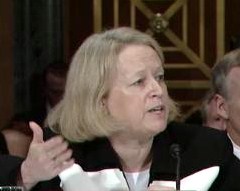By Pam Martens: August 24, 2012
As we’ve mentioned here before, expect to see a lot of anti-consumer news surrounding Wall Street being released in the waning days of August. Media strategists know two things: drop bombs on Friday so the buzz will hopefully be gone by Monday; or, when possible, wait for the lazy last days of summer when vacations, school shopping, and beach going fill the public’s mind.
So it was to be expected that Mary Schapiro, Chair of the SEC, would announce yesterday that she will not proceed with any further reforms on money market funds because “Three Commissioners, constituting a majority of the Commission, have informed me that they will not support a staff proposal to reform the structure of money market funds. The proposed structural reforms were intended to reduce their susceptibility to runs, protect retail investors and lessen the need for future taxpayer bailouts.”
If it sounds like déjà vu back to 2007, it should. Regulators were busy back then turning their backs on a house on fire at Citigroup. Here’s an excerpt from an article I wrote on November 6, 2007:
Dave Serchuk, a reporter for Securities Week at the time, reported in its February 2, 2004 issue that Citigroup had bundled essentially worthless Parmalat debt and sold it in the form of asset backed commercial paper to what U.S. investors thought were among the safest and most liquid investments: money market funds. Unfortunately, the incendiary Parmalat/Citigroup money market story failed to get picked up by mainstream media.
Now, once again, one of the most troubling aspects of the current Citigroup debacle that has gone unreported is the extent to which these opaque and convoluted debt instruments managed by Citigroup, called CDOs (collateralized debt obligations), got dumped into Cayman Islands [Structured Investment Vehicles] SIVs, transmuted into AAA-rated commercial paper, landed in the so-called safe money market funds in the U.S., including an astonishing amount at Citigroup’s competitor, Merrill Lynch.
According to Standard & Poor’s Structured Finance research reports, Citigroup is managing the following Structured Investment Vehicles (SIVs), incorporated in the Cayman Islands and not consolidated on Citigroup’s balance sheet: Centauri Corp., Beta Finance Corp., Sedna Finance Corp., Five Finance Corp., and Dorada Corp. In addition, according to press reports, Citigroup created two more SIVs as recently as November 2006: Zela Finance Corp. and Vetra Finance Corp. These SIVs contain approximately $80 billion in what is increasingly being viewed as toxic debt.
Knowing the history of Citigroup and knowing the safety and liquidity requirements for money market funds, how did one of the oldest and most sophisticated firms on the street, Merrill Lynch, end up with a boatload of this SIV paper in its various money markets? The most troubling of its money market exposure as of its July 31, 2007 filing with the SEC is its Citigroup managed SIV commercial paper positions in what one would think would be the safest of all its money market funds, the Merrill Lynch Retirement Reserves Money Fund. Merrill’s SEC filing shows $52.9 million in Beta Finance, $53 million in Five Finance, $10 million in Sedna Finance, and $10.7 million in Zela Finance.
In a research report written by Meredith Whitney for CIBC World Markets on October 31, 2007, there is a key clue to why Citigroup has finally lost the confidence of the street: “While Citigroup has stated that it will not consolidate the assets of these 7 SIVs, it will continue to provide liquidity. As such, Citigroup’s assets would increase as it extends short term funding to SIVs. With a bigger asset base, or denominator, Citigroup’s capital ratios would decline. While not specifically disclosed, we know that part of the 6% sequential increase in Citigroup’s 3Q07 total assets was from the addition of commercial paper issued to SIVs.” (Translation: it can’t find a new sucker to roll over its maturing SIV commercial paper; it has become the sucker of last resort along with its balance sheet.)
Schapiro effectively kicked the ball over to Congress, having failed to make the case for reform with her own SEC Commissioners. Schapiro had this to say in her press release: “The declaration by the three Commissioners that they will not vote to propose reform now provides the needed clarity for other policymakers as they consider ways to address the systemic risks posed by money market funds. I urge them to act with the same determination that the staff of the SEC has displayed over the past two years.”


